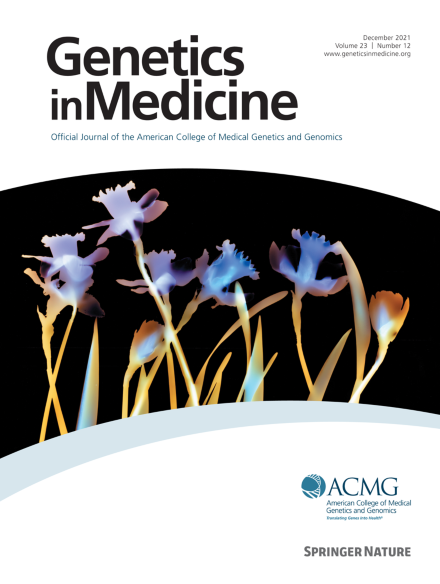CAP/ACMG CYCGH水平测试计划:十年回顾。
IF 6.6
1区 医学
Q1 GENETICS & HEREDITY
引用次数: 0
摘要
目的:自2008年以来,美国病理学家学院(CAP)提供了检测体质设置(CYCGH)中拷贝数变异(CNV)的能力测试(PT)。我们回顾并总结了CYCGH PT项目的数据,包括参与者在一段时间内的表现、项目的变化以及未分级的挑战。方法:回顾了2011年至2021年(共22封邮件)的PT挑战以及随着时间的推移该计划的变化。评估实验室入组情况及表现。结果:随着时间的推移,总体参与增加了,实验室保持了高水平的熟练程度。在调查期间,该计划发生了两次重大变化。挑战未能达成共识的原因各不相同。还讨论了非分级挑战的使用。结论:CYCGH PT程序具有挑战性,因为它评估分析性能和作为单一分析物的解释。随着时间的推移,该计划不断发展,以解决CNV检测领域的变化。在此期间,具有检测拷贝数变异能力的其他技术已经出现,并且正在探索开发与平台无关的CNV PT计划的可能性。本文章由计算机程序翻译,如有差异,请以英文原文为准。
The CAP/ACMG CYCGH proficiency testing program: 10 years in review
Purpose
The College of American Pathologists has offered proficiency testing (PT) for the detection of copy-number variations (CNV) in the constitutional setting (CYCGH) since 2008. We review and summarize data from the CYCGH PT program, including participant performance over time, changes made to the program, and ungraded challenges.
Methods
The PT challenges from 2011 through 2021 (22 total mailings) and changes to the program over time were reviewed. Laboratory enrollment and performance were assessed.
Results
Overall participation has increased over time, and laboratories have maintained a high level of proficiency. The major changes to the program have occurred twice during the time span examined. Reasons for challenges not meeting consensus were varied. The use of ungraded challenges was also discussed.
Conclusion
The CYCGH PT program is challenging because it assesses both analytical performance and interpretation as a single analyte. The program has evolved over time to address the changes in the field of CNV detection. During this time, additional technologies with the ability to detect CNVs have emerged, and the possibility of developing a platform-agnostic CNV PT program is being explored.
求助全文
通过发布文献求助,成功后即可免费获取论文全文。
去求助
来源期刊

Genetics in Medicine
医学-遗传学
CiteScore
15.20
自引率
6.80%
发文量
857
审稿时长
1.3 weeks
期刊介绍:
Genetics in Medicine (GIM) is the official journal of the American College of Medical Genetics and Genomics. The journal''s mission is to enhance the knowledge, understanding, and practice of medical genetics and genomics through publications in clinical and laboratory genetics and genomics, including ethical, legal, and social issues as well as public health.
GIM encourages research that combats racism, includes diverse populations and is written by authors from diverse and underrepresented backgrounds.
 求助内容:
求助内容: 应助结果提醒方式:
应助结果提醒方式:


